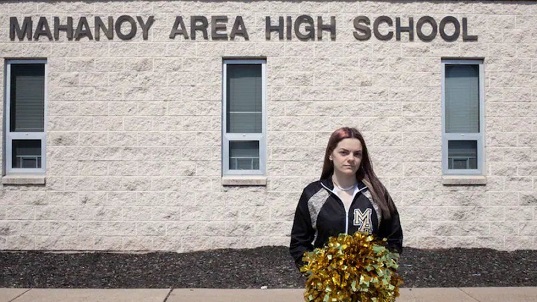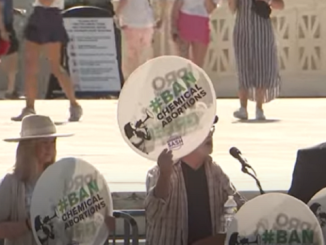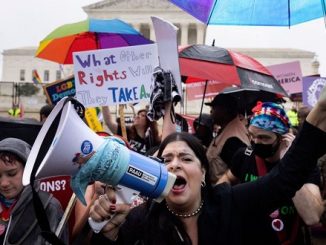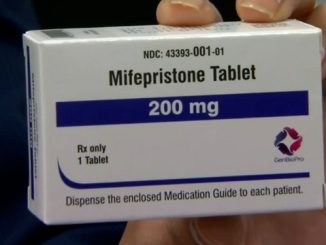
A teenager’s rant that led to her getting kicked off her cheerleading team has reached the US Supreme Court.
Brandi Levy sent a profanity-laden post to her friends on Snapchat in 2017, venting her frustrations with cheerleading and her school.
But when coaches at the Pennsylvania school discovered the post, she was barred from the squad for a year.
The case will determine whether schools have the right to punish pupils for what they say off-campus.
It is being viewed as a major test of the US Constitution’s First Amendment, which protects free speech rights.
Arguments in the case will begin on Wednesday.
What was in the post?
Ms Levy, then 14, posted the snap – a combination of photo and text that disappears after 24 hours – when she was upset about not being chosen for the varsity cheerleading team.
She posted it on a Saturday while at the Cocoa Hut, a 24-hour convenience store in Mahanoy City. The shop is not part of the school.
It showed her with her middle finger raised, and her caption contained a four-letter swear word directed at cheerleading, softball, school, and “everything” generally.
The post was screenshotted by a friend and shown to another pupil, who was the daughter of one of the cheerleading coaches at Mahanoy Area High School.
The coaches then suspended Ms Levy from the team for a year.
She then sued the Mahanoy Area School District, arguing that the decision breached her First Amendment right to free speech.
What is Ms Levy’s argument?
Ms Levy, now 18, says the photo was posted from an off-campus location on a non-school day – meaning the school did not have the authority to discipline her for it.
Pupils’ speech is protected by a landmark Supreme Court case from 1969, Tinker vs Des Moines Independent Community School District, when pupils wore black armbands to protest against the Vietnam War.
The court in that case ruled that pupils’ speech was protected as long as it didn’t cause “material and substantial” disruption to the school.
When Ms Levy’s case reached the Court of Appeal last year, the court in Philadelphia ruled in her favour. It said that the 1969 ruling did not give school officials the authority to discipline pupils for things they say off-campus.
The court emphasised that this ruling did not consider “the First Amendment implications of off-campus student speech that threatens violence or harasses others”.
Ms Levy told the Associated Press news agency: “I’m just trying to prove a point that young students and adults like me shouldn’t be punished for expressing their own feelings and letting others know how they feel.”
What does the school say?
After the Court of Appeal ruling last year, the school district asked the Supreme Court to take up the case.
It argues that staff commonly take action against pupils for speech and actions that happen off-campus – and that in recent times this has become more important, as pupils learning remotely due to Covid-19 has blurred the lines between off-campus and on-campus communications.
It also says that, as Ms Levy’s Snapchat post was sent to her school friends and fellow cheerleaders, it disrupted the school community.
The district argues that a decision in favour of the teenager would make it more difficult for schools to police bullying, racism and harassment that occurs outside of school hours on social media.
Source: bbc.co.uk






Be the first to comment